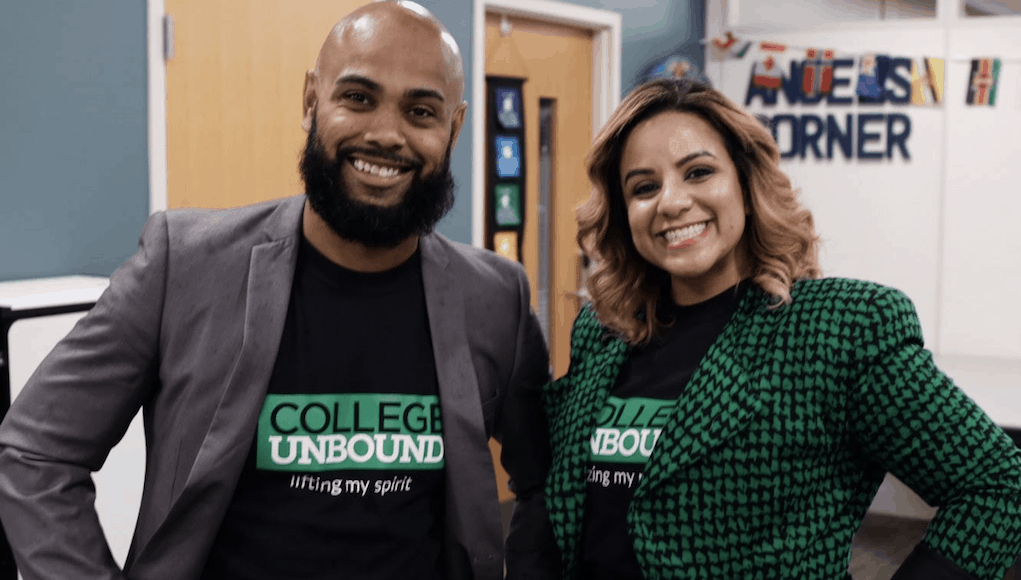College Unbound Helps Working Adults Earn Fast Affordable Degrees

Jose Rodriguez (left above) grew up without many options. As a young man, he went to prison for attempted murder. After getting out he enrolled in a community college but was frustrated with his slow progress. After finding College Unbound, Jose earned an associate’s degree in six months. But Jose reoffended and went back to prison. Fortunately, there was a cohort of College Unbound in prison and he was able to continue making progress. Once released he graduated. Now 35, Jose is house manager at a shelter and provides students support for College Unbound. And, he’s working on a graduate degree.
Zulimar Vidal (right above) was a teen mom. She finished high school at night while taking community college classes. She worked in banking but her lack of a degree held her back. A move into the nonprofit sector was more rewarding for Zuli but her progress remained limited. At an open house for College Unbound, she learned she could earn college credit for projects she had done. With prior credits and credit for learning, Zuli was able to make rapid progress and will graduate in June.
Born in Lebanon, Joyce Aboutaan’s parents moved to the United States for a better life. Joyce initially did well in high school but left as an undocumented teen mother. After earning her GED, she enrolled at UMass (one of the few institutions that that would admit undocumented students) but she had to pay out of state tuition. With no access to aid, tuition bills mounted. She worked several jobs but she couldn’t keep up with the bills and lost her house to foreclosure. Joyce tried a technical college and a community college but wasn’t able to finish a degree. In 2014 she enrolled in College Unbound. She appreciated the one evening a week schedule and the supportive cohort. With all her prior credits and work experience, she was able to graduate in January 2016. Now she’s a project manager at CVS. Her son is a student at The Met and will graduate with an associate’s degree.
Unbound Backstory
With the radical proposition of teaching one student at a time, Dennis Littky and Elliott Washor formed Big Picture Learning. Their first school, The Metropolitan Regional Career And Technical Center (The Met) opened 25 years ago in Providence. Its success spurred the development of a global network of schools, but starting with student interest and constructing a pathway to success remains a radical proposition–in high school and especially in college.
Ten years ago, Littky posted an invitation on Facebook inviting college dropouts to a meeting. He had 78 people show up including a lot of single moms and folks working two jobs. With obvious need, Littky and Adam Bush launched College Unbound to extend the Met’s student-centered approach to help first-generation low-income working adults complete a college degree.
In his trademark kofia and colorful shoes, Littky looks more like an artist than a college president. His authentic style and genuine care quickly earn the trust of adults that faced numerous barriers and achieved limited educational success.

With initial support from Lumina Foundation, the Nellie Mae Foundation, and Big Picture Learning, Littky initially enrolled learners in a local college. The original cohort graduated in 2012 with bachelor’s degrees. In 2014, College Unbound began granting credit through Charter Oak State College, an online college that has been serving adult learners for over 40 years.
Rhode Island approved College Unbound as a degree-granting postsecondary institution in 2015. The following year, College Unbound enrolled its initial cohort independent of a partner university. In 2019, College Unbound was granted candidacy status by the regional accrediting agency NECHE.
Last month the federal government made College Unbound students Pell eligible. This will allow College Unbound to scale and many students to graduate debt free.
Most of the adults College Unbound serves, like Jose, Zuli and Joyce, have attempted college but were unable to finish due to competing family and work demands. Some learners have started and stopped eight times.
Students learn in a small supportive cohort. Some of them work together at the same employer like United Way of Rhode Island. About 80 incarcerated adults are working through a 15-credit curriculum. After leaving prison, a gateway course helps them adjust and immediately enter College Unbound.
College Unbound offers courses, field studies, and project work to help students develop career-ready skills. Learning experiences build 10 competencies: intercultural engagement, critical thinking, communication (written, oral, and visual), problem-solving, accountability, collaboration, creativity, reflection, resilience, and advocacy.
Why College Unbound Works for Working Adults
1. Not alone. College Unbound learners belong to a 15-person cohort with an evening faculty meeting once a week. The cohort communicates all week through WhatsApp and becomes very supportive of each other.
2. Flexibility and support. Small cohorts and personal relationships give college staff a good sense of the kind of support needed from housing to tutoring to mental health services. When a student wants to quit (as many do at some point), peers and staff find ways to meet needs and build persistence.
3. Little amenities matter. College Unbound takes away the excuses for skipping class through supports like serving dinner or babysitting children.
4. Credit for prior learning. College Unbound respects the students past and present experience outside of school. There is a process working with Council for Adults Experiential Learning (a Strada Education affiliate ) where students develop a portfolio of their work to match a course. Students can take a CLEP test from College Board to earn credit in 32 different subjects.
5. Full-time school for full-time workers. Carrying the equivalent of a full college load allows students to finish in a reasonable amount of time. By enabling rapid progress, assembling prior credits, and granting credit for prior learning, students graduate with a bachelor’s degree more quickly than through traditional degree programs.
6. It’s personal. Classes are built around projects of interest to each learner. The project of a student who has a child with Down syndrome creates information to help the public understand disabilities. A woman whose young child died is researching the disease that was responsible. A learner in the United Way cohort built a performance dashboard–and when she presented it, each department wanted their own.
A debt-free personalized college option with supportive cohorts is adding up to high completion rates for adults previously not likely to graduate. For the 37 million working adults in the U.S. with some college and no degree, College Unbound is a great option likely to become more widely available.
For more see:
- How to Be Employable Forever
- Training Engineers to Spot Opportunity and Impact
- Rethinking the College Pipeline: Leading University Gains Youth Badging Platform
Stay in-the-know with innovations in learning by signing up for the weekly Smart Update.
This post was originally published on Forbes.






0 Comments
Leave a Comment
Your email address will not be published. All fields are required.